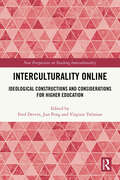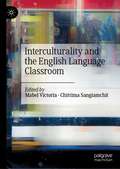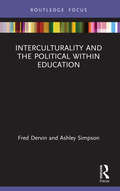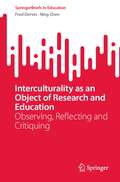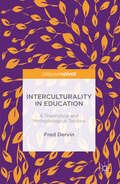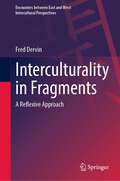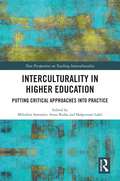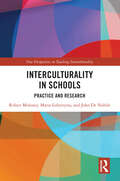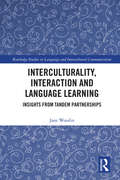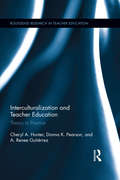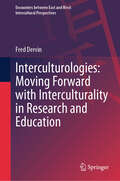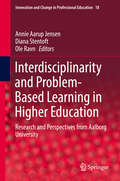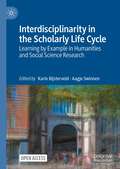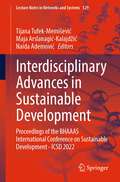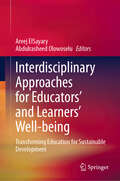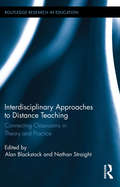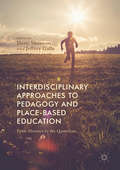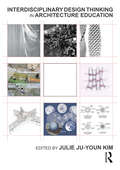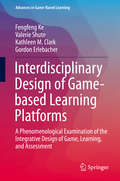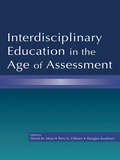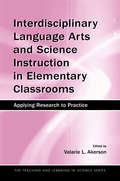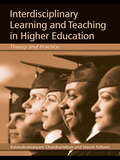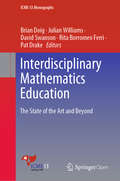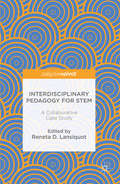- Table View
- List View
Interculturality Online: Ideological Constructions and Considerations for Higher Education (New Perspectives on Teaching Interculturality)
by Fred Dervin Jun Peng Virginie TrémionThe contested and polysemic concept of ideology has been used only marginally in research on intercultural communication education. This edited volume focuses on the ideological dimensions of online interculturality in higher education, encompassing areas such as telecollaboration, virtual classrooms and online teacher professional development.The chapter authors explore the intercultural engagements, perceptions and experiences of students, teachers and researchers in different parts of the world, including Australia, China, Finland, France, Germany, Indonesia, Japan, Mexico, New Zealand, Spain and the USA. In doing so, they aim to contribute to the current critical and reflexive turn in research and teaching that is examining global socio-economic, political and linguistic inequalities and imbalances of power. Using concrete examples from their own practices, the chapter authors critically and reflexively problematise 'doing' interculturality in higher education by identifying, engaging with, reflecting on and revising ideologies of online interculturality. By intersecting interculturality, technology and ideology, this book also makes a critical contribution to the literature on the internationalisation of higher education and its digitalisation.Written in a globally friendly and engaging style, the book will appeal to academics and students of intercultural communication education in online environments.
Interculturality and the English Language Classroom
by Mabel Victoria Chittima SangiamchitThis book examines the concept of interculturality in English Language Teaching (ELT), using examples from diverse international and educational settings to demonstrate different approaches. Increased contact between multilingual speakers from different cultural backgrounds means that linguistic and intercultural competence must be taught hand in hand, and the approaches featured here will: encourage learners to develop intercultural sensitivity and a critical intercultural attitude; mitigate the limitations of textbooks and extend the learning to global issues, intercultural citizenship, and media literacy; show the potential of telecollaboration and popular culture as pedagogical resources; and demonstrate the value of interculturality in English as lingua franca situations and English for Academic Purposes. The chapters feature empirical studies from around the world, and include questions for reflection and recommended reading so that readers can engage more closely with key concepts, compare and adapt the practices most relevant to them. This book contributes to the literature on (inter)cultural pedagogy, English as a lingua franca, language pedagogy, and teacher professional development, and will be an invaluable tool for English language teachers, teacher trainers and educators seeking to enrich their practice. It will also be of interest to students and scholars of Applied Linguistics, especially language education.
Interculturality and the Political within Education (Routledge Research in Education)
by Fred Dervin Ashley SimpsonThis innovative book problematises the internal relationships within and between the intercultural and the political in education. It engages in a critical dialogue with current practices and discourses, and the focus on ‘the political’ offers an alternative trajectory to explore interculturality within education. Drawing on international research and consolidated with application of top interdisciplinary theories in the field, Dervin and Simpson alert us to the current dangers of treating interculturality loosely in education. The authors engage in a dialogue to encourage readers to examine the meaning of interculturality and the state of research in education today, suggesting that we move beyond merely rehearsing theories, concepts and methods. More importantly they urge researchers, teachers and students to question Western-centric ideologies of interculturality. Intercultural and the Political Within Education is a must read for those who are dissatisfied with current intercultural research and education. It will be of great interest to researchers and students of the philosophy of education and those interested in the contemporary debates concerning ideologies, definitions and ownership of interculturality.
Interculturality as an Object of Research and Education: Observing, Reflecting and Critiquing (SpringerBriefs in Education)
by Fred Dervin Ning ChenThis book proposes a new method for working on the complex and polysemic notion of interculturality, aimed at scholars, students and educators who have an interest in enriching and challenging their own take on this somewhat controversial scientific notion. Multiple examples of observability made by the authors are provided to illustrate the method. The book helps readers to look at themselves as ‘producers’, ‘consumers’ and ‘promoters’ of selected knowledge of interculturality. This book represents an original contribution to the field, by introducing the importance of observation and reflexivity in building up varied epistemic engagements with the notion of interculturality.
Interculturality in Education
by Fred DervinThis book explores the decades-long use of the notion of interculturality in education and other fields, arguing that it is now time to move beyond certain assumptions towards a richer and more realistic understanding of the 'intercultural'. Many concepts such as culture, identity and intercultural competence are discussed and revised. Myths about interculturality are also unpacked and dispelled. Written by one of the leading scholars in the field, this book proposes a very useful framework to address theoretical and methodological issues related to interculturality. This somewhat provocative book will be of interest to anyone who wrestles with this knotty but central notion of our times.
Interculturality in Fragments: A Reflexive Approach (Encounters between East and West)
by Fred DervinThis book continues the author’s long-term reflections (over 20 years of scholarship and experience in intercultural communication education) around the fascinating and yet contestable notion of interculturality in education. As an unstable and polysemic notion, interculturality deserves to be opened up again and again and there is a need to engage with it continuously, observing, critiquing and problematizing its complexities. This book urges researchers, students and interculturalists to take the time to think carefully and deeply about interculturality and to find inspiration beyond the dominating ‘Western’ ideological world of intercultural research and education. This book starts from short fragments written by the author for himself over a period of one year. In these short statements and notes about interculturality, the author reflects creatively on the questions he had in mind at the time of writing and offers some (temporary) answers, which, in turn, are questioned and revised. Over the 1000 fragments that the author wrote, he selected about 100, for which he wrote commentaries, referring to and reviewing current research and debates on interculturality in the process. One of the specificities of the book is to be highly multidisciplinary to help us get used to looking for inspiration in other fields of research and creativity. The fragments can be read randomly – the reader may open the book at any page and pick any fragment. The author suggests reading each individual fragment first and then the accompanying explanatory texts. While reading them, the reader is also invited to reflect on any potential addition to what the author wrote – anything they might dis-/agree with, anything they would have wanted to discuss with the author. Questions have been added at the end of each chapter for readers to reflect on and to enrich their own criticality and reflexivity. The book serves as continuous guidance for engaging with interculturality.
Interculturality in Higher Education: Putting Critical Approaches into Practice (New Perspectives on Teaching Interculturality)
by Sommier MélodineEngaging with the topic of critical intercultural education at tertiary level, the book aims to strengthen what critical intercultural communication means and facilitate its implementation in higher education classrooms. With contributors coming from a variety of educational contexts and disciplines, the book provides a versatile and comprehensive picture of how intercultural communication can be approached in different fields. By offering a reflection on theoretical frameworks for teaching and learning critical intercultural communication, it bridges the gap between theory and practice in recent years. Furthermore, it proposes concrete pedagogical solutions that will help educators working at the tertiary level move from essentialist approaches to meaningful intercultural education. Higher education teachers, lecturers and professors responsible for the design and delivery of teaching on intercultural communication will find this book helpful and resourceful.
Interculturality in Schools: Practice and Research (New Perspectives on Teaching Interculturality)
by Robyn Moloney Maria Lobytsyna John De NobileThis book provides a comprehensive study of professional learning courses in intercultural settings, exploring how this impacts teachers and brings about change in classrooms, culture across schools as a whole, and children’s lives. The authors argue that teachers and schools must raise the stakes globally in an intercultural practice grounded in educational equity and anti-racism. Identifying the attributes that make a difference in teacher intercultural learning and change through analysis of both quantitative and qualitative data, the study throws up marked tensions and contradictions between the desire to explore both an abstract personal concept and achieve practical outcomes in schools. As case studies of two primary schools dig deep into teachers’ lives, the book proposes a model of personal teacher interculturality which is constructed from the inside out. The potential of neglected spaces in schools for intercultural identity is also highlighted by images of new practice. This book is a supportive resource for schools or educational institutions, in any global context, that are seeking a fresh approach to intercultural education and holistic change.
Interculturality, Interaction and Language Learning: Insights from Tandem Partnerships (Routledge Studies in Language and Intercultural Communication)
by Jane WoodinThis book opens up new lines of debate in language learning and intercultural communication through an investigation of tandem language learning (a method of language learning based on mutual language exchange between native speakers and learners of each other’s language) in connection with intercultural learning and identity construction. Through an empirical study of face-to-face tandem conversations, Jane Woodin provides compelling evidence for the re-definition of the tandem partnership beyond the traditional native speaker–non-native speaker (NS-NNS) paradigm. By analyzing conversation shapes, learner identification of self and other and interactants’ own focus on culture, this book reveals how interactants themselves address the complexities of language, learning, ownership and meaning. The book also questions the prevalence of models of intercultural competence which describe the competence of the individual, with little recognition of the role of the relationship or interaction. Woodin considers the broader applicability of the tandem framework of autonomy and reciprocity, and suggests new directions for further research on tandem learning.
Interculturalization and Teacher Education: Theory to Practice (Routledge Research in Teacher Education #2)
by Cheryl Hunter Donna PearsonInstitutions of higher education are keen to improve teachers’ intercultural experiences, communication, and understanding, but offer few resources for bringing the research literature to direct application in teacher education programs. This volume addresses that gap by examining what intercultural exchanges in teacher education look like, why they are important, and how they can be maintained. The authors examine how socio-cultural beliefs, institutional structures, and external accreditation bodies interact in the process of interculturalization, highlighting the incentives and barriers as well as strategies to implement and maintain interculturalization projects. Highlighting pragmatic examples, this book addresses the challenges and benefits of interculturalization that can be applied to teacher education programs from both a theoretical and practitioner perspective.
Interculturologies: Moving Forward with Interculturality in Research and Education (Encounters between East and West)
by Fred DervinThis book showcases 100 terms related to the scientific, educational and political notion of interculturality. Each term is presented with its specific multilingual discussions, scientific origins, multifaceted content, and short reviews of the global literature in English. Some myths, imaginaries and ideologies (‘interculturologies’ in the book) that they have led to construct are also introduced. Questions at the end of each entry encourage readers to think further regarding the notion of interculturality in research and education. Based on the author's decades-long experience in researching and teaching in the interdisciplinary field of intercultural communication education in different parts of the world, his constant reflexive and critical engagement with the notion of interculturality, and in-depth reviews of current research, the author has carefully selected (recurrent) concepts, notions, and ideas to be deconstructed in order to challenge readers to think further with him, especially beyond ‘Western’ and certain static and resistant ideological positions. These represent a complex body of concepts and notions, but also involve myths and imaginaries that can prevent us from moving forward in our thinking and in acting interculturally in research and education. This book serves as a reading guide for further interculturologies that the reader might identify in the future or as they engage with the book.
Interdisciplinarity and Problem-Based Learning in Higher Education: Research and Perspectives from Aalborg University (Innovation and Change in Professional Education #18)
by Ole Ravn Annie Aarup Jensen Diana StentoftThis book addresses the relation between Problem-Based Learning (PBL) and interdisciplinarity and challenges the often implicit assumption that PBL leads to interdisciplinarity by default. The book examines theoretical and philosophical aspects of PBL and interdisciplinary learning. The first part of the book conceptualises the notions of problem-based learning and interdisciplinary learning, and highlights some key overlaps and ways of conceiving of their interrelatedness. It discusses the role of problem-based medical education in relation to interdisciplinary professionalism in medical education. Taking the reader into the realm of techno-anthropology, the book discusses the role of problems and projects in transgressing disciplines, and presents an analysis of three challenges facing new students when entering interdisciplinary and problem-based higher education. The second part of the book focuses on practicing interdisciplinarity in problem-based higher education. It explores how the construction of problems in interdisciplinary PBL projects can be seen from the perspectives of multicultural groups, and examines group processes in interdisciplinary PBL projects. It concludes by taking a closer look at student practices in interdisciplinary PBL, and at how students are positioned and position themselves in the complex transdisciplinary PBL project.
Interdisciplinarity in the Scholarly Life Cycle: Learning by Example in Humanities and Social Science Research
by Karin Bijsterveld Aagje SwinnenThis open access book illustrates how interdisciplinary research develops over the lifetime of a scholar: not in a single project, but as an attitude that trickles down, or spirals up, into research. This book presents how interdisciplinary work has inspired shifts in how the contributors read, value concepts, critically combine methods, cope with knowledge hierarchies, write in style, and collaborate. Drawing on extensive examples from the humanities and social sciences, the editors and chapter authors show how they started, tried to open up, dealt with inconsistencies, had to adapt, and ultimately learned and grew as researchers. The book offers valuable insights into the conditions and complexities present for interdisciplinary research to be successful in an academic setting.This is an open access book.
Interdisciplinary Advances in Sustainable Development: Proceedings of the BHAAAS International Conference on Sustainable Development -ICSD 2022 (Lecture Notes in Networks and Systems #529)
by Naida Ademović Tijana Tufek-Memišević Maja Arslanagić-KalajdžićThis book presents interdisciplinary research and scientific outcomes in sustainable development acquired from the BHAAAS International Conference on Sustainable Development-ICSD2022 as part of the 13th Days of Bosnian-Herzegovinian American Academy of Arts and Sciences held in Sarajevo, June 23-26, 2022. The main event enabled researchers and experts from 25 countries to exchange their knowledge, ideas and experiences. The general scope of the book includes topics presented at three specialized symposia: The Quadruple Helix Approach, Sustainable Urban Development and Sustainable Civil Engineering with research topics ranging from SDGs, sustainable development education, environmental and social responsibility and consumption to sustainable retrofit strategies, urban heritage conservation, urban mobility, Space Syntax analysis, watercourse recovery, railway corridors and more. The book is recommended for fellow researchers, professionals, and students in the fields of economy, politics, architecture, urban planning, civil engineering and related fields.
Interdisciplinary Approaches for Educators' and Learners’ Well-being: Transforming Education for Sustainable Development
by Areej ElSayary Abdulrasheed OlowoseluThis book bridges knowledge gaps by exploring transformative approaches for sustainable development to ensure high-quality and positive education and increase educators' and learners’ well-being. It offers research findings, best practices, case studies and empirical research. The work inspires and guides educators in implementing effective strategies by means of interdisciplinary approaches. It is a valuable resource supporting ongoing professional development for teachers and educational leaders, enhancing pedagogical strategies, curriculum design and a safe positive educational environment. Additionally, it addresses global challenges in education, fostering a broader discourse on education's role in promoting interdisciplinary approaches, sustainable development, and well-being for a more inclusive future.
Interdisciplinary Approaches to Distance Teaching: Connecting Classrooms in Theory and Practice (Routledge Research in Education)
by Nathan Straight Alan BlackstockSynchronous technologies, particularly interactive video conferencing (IVC), are becoming common modes of teaching and delivering college courses. The increasing popularity of IVC in the U.S. and abroad calls for more pedagogically effective practices for instructors using this technology. This volume focuses on innovative and proven approaches to IVC teaching in a variety of disciplines: English, history, biology, chemistry, geology, engineering, social work, and elementary and special education. Contributors hail from a pioneering university at the forefront of distance education and understand the practice and potential of IVC teaching at the highest levels. Chapters outline the challenges and benefits of IVC teaching from pedagogical, technical, and administrative perspectives.
Interdisciplinary Approaches to Pedagogy and Place-Based Education
by Deric Shannon Jeffery GalleThis book brings together scholars from a wide range of disciplines to creatively engage with place in the context of pedagogy. Beginning with an exploration of traditional place-based forms of education, such as outdoor education, travel courses, and courses on sustainability, the authors go on to expand our popular notions of place, including the classroom, the campus, our interior selves, and our digital ecosystems. This reconsideration of place-based education represents not only an engagement of prior literature on pedagogy and place, but also a re-imagining of the role that place might play in education. Authors stretch the notion of place, arguing for a holistic approach to disciplines in the humanities, social sciences, and natural sciences, bringing into focus an array of contentious issues in philosophies and methods of teaching for multiple academic disciplines and their many intersections.
Interdisciplinary Design Thinking in Architecture Education
by Kim, Julie Ju-YounThis book explores the creative potential for architecture curricula to integrate solid interdisciplinary thinking in design studio education. Annotated case studies, both from academic institutions and from professional practices, provide examples of interdisciplinary engagement in creative design work, highlighting the challenges and opportunities of this approach. Cases are from a diverse selection of international collaborators, featuring projects from the United States, Australia, Mexico, Germany, and Italy, and cover a range of project types and scales. Chapters by invited experts offer speculations on current and future models, situating examples within the broader context, and encouraging dialogue between practice and pedagogy. The collection of voices in this book offers critical and provocative lenses, learning from history while forging inventive and creative roles for the architect as practitioner, entrepreneur, strategist, choreographer, activist, facilitator, leader, and teacher. Interdisciplinary Design Thinking provides insights into the potential of interdisciplinary engagement at the level of foundational undergraduate education, making it ideal for faculty in architecture schools. It will also be of interest to design professionals concerned with interdisciplinary collaboration and how to incorporate similar efforts in their own practices.
Interdisciplinary Design Thinking in Architecture Education
by Kim, Julie Ju-YounThis book explores the creative potential for architecture curricula to integrate solid interdisciplinary thinking in design studio education.Annotated case studies, both from academic institutions and from professional practices, provide examples of interdisciplinary engagement in creative design work, highlighting the challenges and opportunities of this approach. Cases are from a diverse selection of international collaborators, featuring projects from the United States, Australia, Mexico, Germany, and Italy, and cover a range of project types and scales. Chapters by invited experts offer speculations on current and future models, situating examples within the broader context, and encouraging dialogue between practice and pedagogy. The collection of voices in this book offers critical and provocative lenses, learning from history while forging inventive and creative roles for the architect as practitioner, entrepreneur, strategist, choreographer, activist, facilitator, leader, and teacher.Interdisciplinary Design Thinking provides insights into the potential of interdisciplinary engagement at the level of foundational undergraduate education, making it ideal for faculty in architecture schools. It will also be of interest to design professionals concerned with interdisciplinary collaboration and how to incorporate similar efforts in their own practices.
Interdisciplinary Design of Game-based Learning Platforms: A Phenomenological Examination of the Integrative Design of Game, Learning, and Assessment (Advances in Game-Based Learning)
by Fengfeng Ke Kathleen M. Clark Valerie Shute Gordon ErlebacherThis book represents a four-year research and development project. It presents a phenomenological examination and explanation of a functional design framework for games in education. It furnishes a rich description of the experiences and perceptions of performing interdisciplinary collaborative design among experts of very diverse fields, such as learning systems design, architectural design, assessment design, mathematics education, and scientific computing.
Interdisciplinary Education in the Age of Assessment
by Terry A. Osborn David M. Moss Douglas KaufmanInterdisciplinary Education in the Age of Assessment addresses a prevalent need in educational scholarship today. Many current standards-driven curricula follow strict subject-specific guidelines, leaving educators little room for interdisciplinary innovation. This book gears itself toward developing assessment models specific to interdisciplinary education, positioning itself as a seminal volume in the field and a valuable resource to educators across the disciplines. Each chapter covers a major subject area (literacy, science, math, social studies, bilingual education, foreign language, educational policy) and discusses methods of assessing integrated/ interdisciplinary curriculum and instruction.
Interdisciplinary Language Arts and Science Instruction in Elementary Classrooms: Applying Research to Practice (Teaching And Learning In Science Ser.)
by Valarie L. AkersonThis volume brings together evidence-based approaches to interdisciplinary language arts and science instruction. Firmly grounded in the research showing cognitive parallels between the two subjects, and reflecting the many recommendations in recent years for using interdisciplinary instruction at the elementary level, its goal is to help teachers effectively use this kind of instruction in elementary classrooms. The book is organized around three themes:*Introduction to Interdisciplinary Science and Language Arts Instruction;*The Influence of Interdisciplinary Science and Language Arts Instruction on Children’s Learning; and*Research on Preparing Elementary Teachers to Use Interdisciplinary Science and Language Arts Instruction Each chapter summarizes the research on its focal topic. Examples of research applied to practice, and questions and prompts for discussion and reflection help readers apply what they are reading in their own classroom contexts. Teacher educators and prospective and practicing elementary teachers everywhere will benefit from this overview of current research and practice in interdisciplinary science and language arts instruction.
Interdisciplinary Learning and Teaching in Higher Education: Theory and Practice
by Stephen Fallows Balasubramanyam ChandramohanAs universities increasingly offer courses that break the confines of a single subject area, more students are enrolling on interdisciplinary programmes within multidisciplinary departments. Teaching and learning within interdisciplinary study requires new approaches, including an understanding of the critical perspectives and frameworks and the rearranging of intellectual and professional boundaries. Interdisciplinary Learning and Teaching in Higher Education explores the issues and tensions provoked by interdisciplinary learning, offering helpful information for: Staff development Distance learning Mass communication courses Interdisciplinary science courses Grounded in thorough research, this collection is the first of its kind to provide practical advice and guidance from around the world, improving the quality of teaching and learning in interdisciplinary programmes.
Interdisciplinary Mathematics Education: A State Of The Art (ICME-13 Monographs)
by David Swanson Julian Williams Brian Doig Rita Borromeo Ferri Pat DrakeThis open access book is the first major publication on the topic of “Interdisciplinary Mathematics Education” and arose from the work of the first International Topic Study Group of the same name at the ICME-13 conference in Hamburg in 2016. It offers extensive theoretical insights, empirical research, and practitioner accounts of interdisciplinary mathematics work in STEM and beyond (e.g. in music and the arts). <P><P> Scholars and practitioners from four continents contributed to this comprehensive book, and present studies on: the conceptualizations of interdisciplinarity; implementation cases at schools and tertiary institutions; teacher education; and implications for policy and practice. Each chapter, and the book itself, closes with an assessment of the most significant aspects that those involved in policy and practice, as well as future researchers, should take into account.
Interdisciplinary Pedagogy for STEM
by Reneta D. LansiquotThis book focuses on constructivist theory and collaborative interdisciplinary studies, showing how constructivist theory complements interdisciplinary studies. Constructivist theory stresses how learners construct new ideas and concepts, while the interdisciplinary method requires that learners approach complex problems from multiple perspectives. The author uses the New York City College of Technology as a model to demonstrate how learning can be embedded in complex, realistic, and relevant environments. As a result, students learn to consider significant issues from a variety of viewpoints and thus negotiate their social landscape. In approaching problems that they recognize as meaningful, they take ownership of their learning and become increasingly self-aware. This scholarly book makes a theoretical contribution to its field while also offering a practical, real world example of how to successfully integrate a curriculum.
